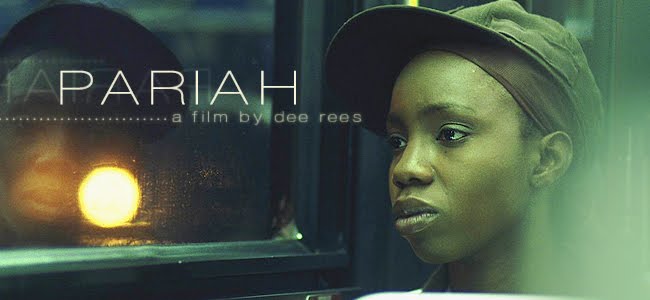In public, seventeen-year-old Alike, or Lee (Adepero Oduye), dresses in boys’ jackets, baggy pants, and sports shoes. Her hair is short on its own, but she makes it even shorter by tying it back into a bun, and she hides it all under a baseball cap. She’s not trying to pass herself off as a boy – she’s just trying to wear what makes her most comfortable. But during bus rides home, she will take off the cap, let down her hair, remove the jacket, and reveal a form-fitting white shirt with a jeweled butterfly printed on it. She will even put earrings on. She will stop short, however, of putting on makeup. She makes herself look just feminine enough without becoming too girly. This is to sate her mother, Audrey (Kim Wayans), who doesn’t approve of her tomboy looks and always tries to buy her more overtly female clothing.
Lee is, of course, going through the process of accepting herself as a lesbian. She has yet to come out to her family. She has every reason to be hesitant, especially when it comes to her mother, who’s so determined to keep up appearances that she will try to make her daughter into something she’s not. She gets along better with her father, a cop named Arthur (Charles Parnell); at least they can play basketball together. But there’s still a great deal of tension between them. He wants a daddy’s girl, and he refuses to see his daughter’s tomboy lifestyle as anything other than a phase. It doesn’t help that he’s quietly menacing, emotionally walled off, and apparently not in love with his wife. How he got this chip on his shoulder, no one really knows. It’s strongly suggested, though, that he doesn’t appreciate having to work extra to accommodate Audrey’s excessive spending.
One of the greatest strengths of Pariah, director Dee Rees’ feature-length expansion of her own 2007 short film, is that its themes are universal. Despite what appearances suggest, it’s not about homosexuality; it’s about identity and the dangers of forbidden love. This can take on so many forms – cultural taboos, generation gaps, religious intolerance, personality quirks, physical deformity – and still amount to the same thing. Appreciating this movie does not require that you be gay or even tolerant of gay people. All that’s required of you is an understanding of how it feels to be different in some way. Have you ever been made fun of for a funny name, or an unusual hairstyle, or a unique style of dress? Has your family ever disapproved of your life decisions, like becoming an actor when they wanted you to become a doctor? Have you ever formed a friendship with someone disapproved of by others? If you can relate to any of this, or to any other circumstances I didn’t mention, this movie will speak to you.
Lee’s best friend is an open lesbian named Laura (Pernell Walker), who lives with her sister and is trying to earn her GED. She often brings Lee to an all-female strip club and actively tries to hook her up with a girlfriend. Lee’s mother doesn’t approve of Laura. She would much rather see her be friends with a girl named Bina (Aasha Davis), the daughter of one of her work colleagues. Lee and Bina initially don’t hit it off; Lee knows it’s only to make each of their mothers happy. But as they spend more time together, it becomes apparent that Bina is hiding forbidden feelings of her own. But is she as willing to embrace her lesbianism? Is she even a lesbian? Sexuality is almost never set in stone, especially when you’re still a teenager. Hormones sure do cause a lot of problems.
The film features some of the year’s best performances. Of particular note is Oduye, who wisely restrains herself from being too precocious. In just about every scene, she makes Lee seem like a natural teenager – confused about herself, at odds with her family, and desperate to make a connection with someone who understands her. She expresses herself through poetry, which has become her passion. This isn’t to say she’s an expert. One of my favorite scenes is early on, when she shows her latest work to her writing teacher. The consensus: Lee’s writing is competent, but it could be much deeper. I majored in Creative Writing in college, so let me assure you, I’ve know what Lee felt at that very moment. There’s nothing quite like submitting what you believe to be your best work, only for it to be mercilessly criticized by your professors.
I was also impressed by Kim Wayans, whose take on Audrey is convincingly desperate. There’s an interesting moment early in the film when, at work, she walks into the lounge area for lunch. Two other women are already in the room. They say nothing, but they take a disapproving look at her before getting up and leaving the room. Why do they dislike her? It’s never directly stated, but her actions throughout the film suggest a woman who has alienated herself by being so judgmental. Her head is full of ideals, many of them impossible. It seems her daughter is not the film’s only pariah. I always appreciate it when a movie’s title applies to more than one character, as it adds depth and complexity. If you can see your way past the superficial aspects, and I sincerely hope that you can, you will find that Pariah is a powerful, compelling film.

